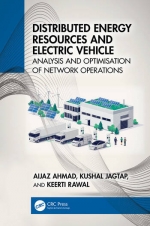Tab Article
Explore the prospective developments in energy systems and transportation through an in-depth examination of Distributed Energy Resources and Electric Vehicle: Analysis and Optimisation of Network Operations. This innovative publication explores the realm of renewable energy, electric vehicles, and their in uence on network operations, offering valuable perspectives for readers from diverse disciplines.
This extensive publication delves into the complex interplay between distributed energy resources (DERs) and electric vehicles (EVs), as well as their incorporation into established power grids. The subject matter encompasses a diverse array of topics, encompassing the attributes and advantages of distributed energy resources (DERs) and electric vehicles (EVs), obstacles related to grid integration, efficient allocation of resources, and strategies pertaining to demand response. The book offers a comprehensive exploration of system analysis and optimisation techniques, emphasising the effective utilisation of distributed energy resources (DERs) and electric vehicles (EVs) in energy networks. It aims to equip readers with a robust comprehension of strategies to optimise the performance and potential of DERs and EVs in this context.
The book focuses on pioneering research and innovative solutions that are at the forefront of enhancing network operations. The authors demonstrate the novelty and applicability of their - ndings through the examination of real-world case studies and the utilisation of sophisticated mathematical models. This book serves as a highly valuable resource for individuals engaged in research, engineering, policy-making, and industry-related activities, who are interested in effectively navigating the dynamic realm of energy systems and transportation. It equips them with the necessary knowledge and insights to make well-informed decisions that contribute to the attainment of a sustainable future.


